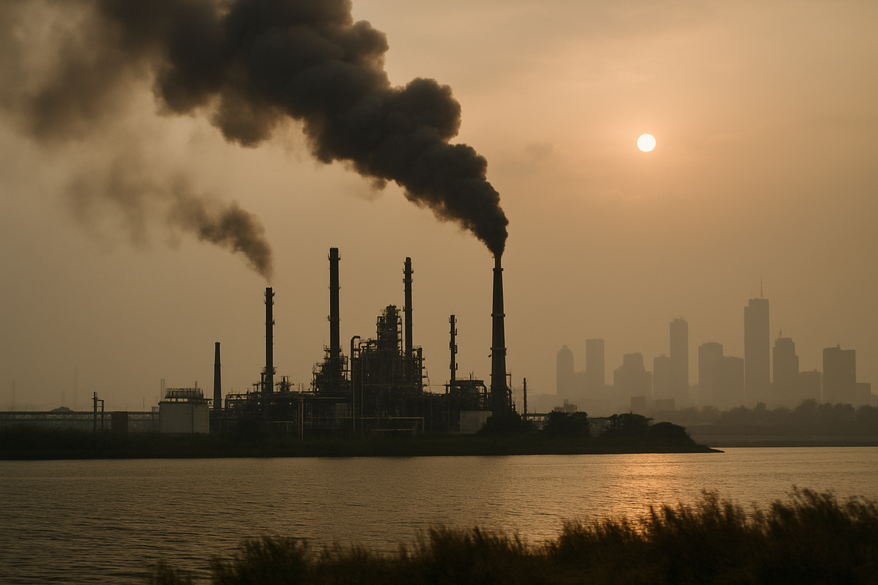Navigating Shifts in Global Oil and Gas Emissions Standards: Shell’s Recent Decisions and Industry Implications
The recent pause on the global oil and gas emissions standard and Shell’s decision to discontinue key climate commitments reflect the growing tensions in balancing business objectives with environmental accountability. At Teknologam Sdn Bhd, we closely monitor these developments to understand their impact on industry practices and sustainability goals. Shell’s move, coupled with accusations of greenwashing and scrutiny over its contributions to climate change, underscores the evolving pressures that oil and gas companies face today.
Key Takeaways
- The global oil and gas emissions standard has been paused, creating uncertainty for industry-wide environmental regulation enforcement.
- Shell has scaled back its engagement in some climate initiatives, raising concerns about its true commitment to reducing carbon footprints.
- Accusations of greenwashing against Shell highlight the need for transparent reporting and verified emission reductions.
- Both Shell and BP reportedly are scaling back their commitments to renewable energy, signaling a cautious approach amidst market and regulatory pressures.
- These changes may prompt industry players to reevaluate sustainability strategies and technological investments for long-term resilience.
The Pause on Global Oil and Gas Emissions Standards
The global regulatory framework aimed at curbing oil and gas emissions has stalled, delaying enforcement timelines. This pause impacts how companies report and manage their carbon emissions, hindering international alignment on emission reduction targets. Shell’s decision to exit certain emissions-related commitments exemplifies the friction between regulatory demands and operational realities in oil and gas extraction and processing.
The absence of an active global emissions standard challenges the industry’s ability to demonstrate progress transparently. It forces companies to self-regulate or rely on less uniform guidelines, potentially undermining overall climate goals.
- Regulatory uncertainty risks uneven progress across markets.
- Companies must invest in internal monitoring systems.
- Stronger regional policies could fill the global gap.
“Without a unified global emissions standard, maintaining transparency and trust in Shell’s sustainability claims becomes more complex.”
Shell Emissions and Accusations of Greenwashing
Shell remains one of the largest emitters in the oil and gas sector, with its contributions to climate change under intensified scrutiny. Recent analyses reveal that the company’s CO2 output remains substantial despite its promises to reduce it. Critics accuse Shell of greenwashing—promoting environmentally friendly messaging while continuing significant fossil fuel production.
For industry specialists like Teknologam, this situation serves as a reminder that true sustainability requires measurable reductions, not merely reputational efforts. Shell’s challenge is to substantiate claims with data and actionable steps rather than marketing gloss.
Key Insight: Verifiable emission reductions and transparent reporting will define credibility and stakeholder trust moving forward.
- Shell annually produces millions of tons of CO2 emissions globally.
- Emissions disclosures are improving but vary in depth and consistency.
- Accusations of greenwashing may affect investor and public confidence.
Scaling Back Renewable Energy Commitments: BP and Shell’s Shift
Both BP and Shell recently announced a pullback in their renewable energy pledges, reflecting market volatility and shifting priorities. This strategic retreat underlines the complex economics of energy transition amid fluctuating oil prices and capital allocation pressures. For suppliers and partners in the oil and gas manufacturing space, such as Teknologam, these trends signal a potential slowdown in renewable-related investments.
The scale-back prompts questions about how swiftly oil majors can pivot toward low-carbon energy sources without compromising shareholder returns. Additionally, it suggests the need for technology providers to innovate solutions that efficiently integrate traditional and renewable energy assets.
- Renewables investment scale-backs may delay energy transition timelines.
- Oil and gas manufacturers must adapt to evolving client strategies.
- Collaboration on hybrid solutions could bridge energy infrastructure gaps.
“Our industry must reconcile the dual challenge of upholding production demands while advancing meaningful emission reductions.”
Looking Ahead: Internal Reflections and Industry Strategy
These unfolding developments at Shell and across the sector present an opportunity for introspection. Teknologam prioritizes innovation that supports emission reductions in oil and gas operations, emphasizing intensified monitoring, cleaner technologies, and energy efficiency. As global standards waver, companies genuinely committed to sustainability will be better positioned to navigate regulatory shifts and public expectations.
The oil and gas industry faces a pivotal moment: either lead transition efforts or risk reputational and operational setbacks. At Teknologam, we view this as a compelling call to strengthen our commitments to sustainable manufacturing practices and collaborative industry progress.
Key Insight: Sustainability leadership depends not only on targets but on transparent, accountable execution aligned with emerging regulations.
In summary, the global pause on emission standards, Shell’s retreat from certain climate initiatives, and the wider industry scaling back of renewables warrant close attention. These factors converge to reshape how oil and gas companies manage their environmental impact. Navigating this landscape thoughtfully aligns with Teknologam’s mission to deliver responsible manufacturing solutions for the evolving energy sector.
For further insights on global emissions standards, see Greenhouse Gas Protocol and to understand the nuances of greenwashing, refer to Environmental Defense Fund for detailed analyses.
